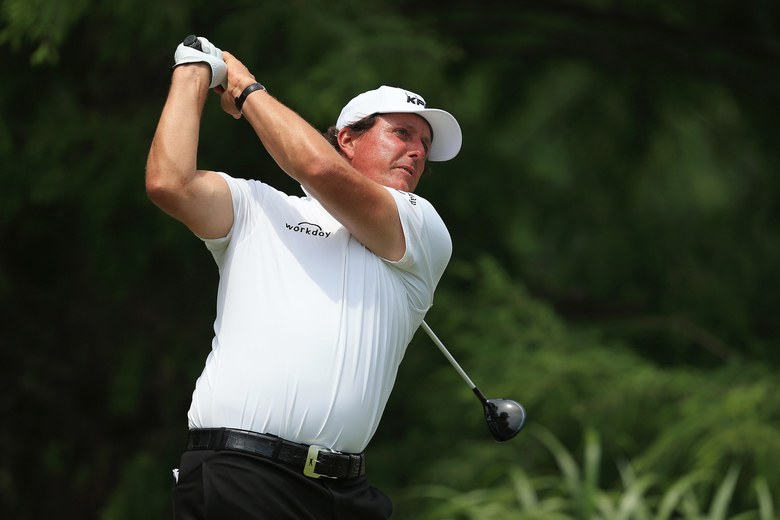Photo by Sarah Crabill/Getty Images
By Joel Beall
SOUTHAMPTON, N.Y. — Phil Mickelson’s press conferences often feel a bit like performance art. They are not interviews or conversations so much as classes, Mickelson, the raconteur professor, relishing the chance to educate and pontificate. Opinion and fact are often blurred, yet Lefty says everything with the utmost conviction and energy that no one seems to mind.
Monday, however, was not one of those instances.
Mickelson, the rare athlete who doesn’t mind the media obligation, didn’t seem to be in much of an entertaining mood at Shinnecock Hills. His trademark buoyancy was replaced by a business-like tenor, questions countered in sentences instead of monologues. Maybe he’s trying to stay on brand with his new button-down endorsement deal, although the answer is likely different.
It would be easy to chalk this demeanor up to perception. This is the U.S. Open, after all, the tournament that’s painfully eluded the man for three decades. That Shinnecock Hills was the site of one of his six runner-ups doesn’t ease that torment.
[divider] [/divider]
WATCH NOW: WHAT’S AT STAKE AT THE U.S. OPEN AT SHINNECOCK
[divider] [/divider]
But that’s perception, and according to Mickelson, the reality is different. This is one of his favorite courses, and despite some harsh comments towards the USGA at the Memorial, he views this as his playground.
“It’s the best setup, in my opinion, that we’ve seen,” Mickelson said. “I feel as though the luck of a course has been taken out as much as possible to where skill is the primary factor.”
Nor did he seem to mind responding to multiple questions about the 2004 championship, where a late mistake was the difference between he and winner Retief Goosen.
“Certainly, the turning point was my double on 17, because I had just birdied three of the last four holes to get myself in position to win the tournament,” he said. “But the double I made was the biggest factor. I mean, unfortunately, it was a bad time.”
And when confronted with his past criticism of the 2004’s notorious conditioning, he didn’t shy away.
“I think it’s a very difficult job to find the line of testing the best players to the greatest degree and then making it carnival golf,” Mickelson said. “For instance, the [2004] barometer for watering the seventh green was, ‘Did anybody make double or triple?’ So if nobody doubled or tripled in the group in front of you, the green did not get water. If your group made a double or triple, the green got water for the group behind you. That type of chance is, it bothers me, given that we put so much into this tournament and the dreams and the hopes.”
So it seems that this is Mickelson’s latest approach to the equation he’s been unable to solve. The U.S. Open is a grind, and, turning 48 this week, preservation is as crucial as ever. It’s easy to get caught up in the conjecture and “What this MEANS” ramifications, hypotheticals Mickelson admitted to falling victim to in the past.
“The more I think about winning, the more it detracts away from my focus and the process of playing a round on Thursday,” he said.
Mickelson is well aware of what the U.S. Open, and a win, means. That is for the future Phil to worry about. Right now, he’s too in the present to bother with that.
“I’m still in the process of collecting more wins,” he said, regarding talk of legacy. His goal at the moment is to merely get to the weekend, with an opportunity in hand.
“It’s just that I don’t want to get ahead of myself, and I don’t want to start thinking about results,” Mickelson said. “The way you get in trouble here is you anticipate too much and you get too far ahead.”
That’s uncomplicated and cliched. Normally, the antithesis of the Phil Mickelson Experience. But the definition of insanity is doing the same thing over and over again, only to expect divergent results. U.S. Open: Attempt No. 27, Mickelson conveyed, needs to be different.
So no, Phil Mickelson didn’t have his usual energy behind the mic on Monday. But the professor still delivered the class a lesson. And, maybe, to himself.









